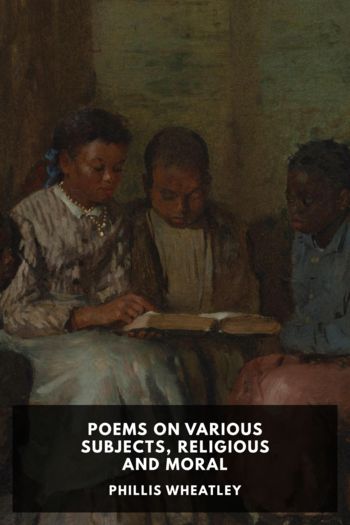The Autobiography of Benjamin Franklin - Benjamin Franklin (pocket ebook reader .txt) 📗

- Author: Benjamin Franklin
Book online «The Autobiography of Benjamin Franklin - Benjamin Franklin (pocket ebook reader .txt) 📗». Author Benjamin Franklin
“ ‘Our seminaries of learning,’ says Gibbon, ‘do not exactly correspond with the precept of a Spartan king, that the child should be instructed in the arts which will be useful to the man; since a finished scholar may emerge from the head of Westminster or Eton, in total ignorance of the business and conversation of English gentlemen in the latter end of the eighteenth century. But these schools may assume the merit of teaching all that they pretend to teach, the Latin and Greek languages.’ ” —Bigelow ↩
George Whitefield, pronounced Hwit’field (1714–1770), a celebrated English clergyman and pulpit orator, one of the founders of Methodism. ↩
A part of the palace of Westminster, now forming the vestibule to the Houses of Parliament in London. ↩
William Penn’s agents sought recruits for the colony of Pennsylvania in the low countries of Germany, and there are still in eastern Pennsylvania many Germans, inaccurately called Pennsylvania Dutch. Many of them use a Germanized English. ↩
James Logan (1674–1751) came to America with William Penn in 1699, and was the business agent for the Penn family. He bequeathed his valuable library, preserved at his country seat, “Senton,” to the city of Philadelphia. —Smyth ↩
See the votes. —Marg. note ↩
The Franklin stove is still in use. ↩
Warwick Furnace, Chester County, Pennsylvania, across the Schuylkill River from Pottstown. ↩
Tench Francis, uncle of Sir Philip Francis, emigrated from England to Maryland, and became attorney for Lord Baltimore. He removed to Philadelphia and was attorney-general of Pennsylvania from 1741 to 1755. He died in Philadelphia August 16, 1758. —Smyth ↩
Later called the University of Pennsylvania. ↩
See the votes to have this more correctly. —Marg. note ↩
Gilbert Tennent (1703–1764) came to America with his father, Rev. William Tennent, and taught for a time in the “Log College,” from which sprang the College of New Jersey. —Smyth ↩
See votes. ↩
Vauxhall Gardens, once a popular and fashionable London resort, situated on the Thames above Lambeth. The Gardens were closed in 1859, but they will always be remembered because of Sir Roger de Coverley’s visit to them in the Spectator and from the descriptions in Smollett’s Humphry Clinker and Thackeray’s Vanity Fair. ↩
A short street near Charing Cross, London. ↩
The “round, selfish, and self-important” squire of Don Quixote in Cervantes’ romance of that name. ↩
My acts in Morris’s time, military, etc. —Marg. note ↩
On Lake Champlain, ninety miles north of Albany. It was captured by the French in 1731, attacked by the English in 1755 and 1756, and abandoned by the French in 1759. It was finally captured from the English by the Americans in 1775. ↩
By chance. ↩
Pittsburg. ↩
Kingston, at the eastern end of Lake Ontario. ↩
Other accounts of this expedition and defeat may be found in Fiske’s Washington and His Country, or Lodge’s George Washington, Vol. 1. ↩
A famous Scotch philosopher and historian (1711–1776). ↩
Governor of Massachusetts and commander of the British forces in America. ↩
This dialogue and the militia act are in the Gentleman’s Magazine for February and March, 1756. —Marg. note ↩
Pronounced Gna’-den-hoot. ↩
Flintlock guns, discharged by means of a spark struck from flint and steel into powder (priming) in an open pan. ↩
Here the pole connecting the front and rear wheels of a wagon. ↩
The Royal Society of London for Improving Natural Knowledge was founded in 1660 and holds the foremost place among English societies for the advancement of science. ↩
A celebrated French naturalist (1707–1788). ↩
Dalibard, who had translated Franklin’s letters to Collinson into French, was the first to demonstrate, in a practical application of Franklin’s experiment, that lightning and electricity are the same. “This was May 10th, 1752, one month before Franklin flew his famous kite at Philadelphia and proved the fact himself.” —McMaster ↩
An English baronet (died in 1709), donator of a fund of £100, “in trust for the Royal Society of London for improving natural knowledge.” ↩
Quarrel between George II and his son, Frederick, Prince of Wales, who died before his father. ↩
A satirical poem by Alexander Pope directed against various contemporary writers. ↩
William Pitt, first Earl of Chatham (1708–1778), a great English statesman and orator. Under his able administration, England won Canada from France. He was a friend of America at the time of our Revolution. ↩
This relation illustrates the corruption that characterized English public life in the eighteenth century. (See Chapter XIX.) It was gradually overcome in the early part of the next century. ↩
A piece of wood shaped and weighted so as to keep it stable when in the water. To this is attached a line knotted at regular distances. By these devices it is possible to tell the speed of a ship. ↩
A celebrated prehistoric ruin, probably of a temple built by the early Britons, near Salisbury, England. It consists of inner and outer circles of enormous stones, some of which are connected by stone slabs. ↩
“Here terminates the Autobiography, as published by William Temple Franklin and his successors. What follows was written in the last year of Dr. Franklin’s life, and was never before printed in English.” —Mr. Bigelow’s note





Comments (0)